Search result67 results
-
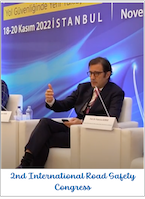
2nd International Road Safety Congress
Francisco Alonso
(2022). Participació en congressosDr. Francisco Alonso, Director of INTRAS, participates in the 2nd International Road Safety Congress, to be held in Istanbul from 18 to 20 November 2022. With the lecture "Key aspects for improving enforcement as a tool to increase road safety", whose authors are Dr. Alonso, Mireia Faus and Sergio Useche, the Director of INTRAS explains that the regulations, the sanctioning system and police supervision are some of the main components to increase road safety and analyses some of the principles that the application of the regulations must comply with to maximise their usefulness. 2nd International Road Safety Congress is organized by the Directorate of Traffic Institute, The Turkish...
Dr. Francisco Alonso, Director of INTRAS, participates in the 2nd International Road Safety Congress, to be held in Istanbul from 18 to 20 November 2022. With the lecture "Key aspects for improving enforcement as a tool to increase road safety", whose authors are Dr. Alonso, Mireia Faus and Sergio Useche, the Director of INTRAS explains that the regulations, the sanctioning system and police supervision are some of the main components to increase road safety and analyses some of the principles that the application of the regulations must comply with to maximise their usefulness. 2nd International Road Safety Congress is organized by the Directorate of Traffic Institute, The Turkish National Police Academy in order to reach up to date information about road safety, Exchange of information in the matter of innovative researchs and applications and contribute to scientific studies aimed at reducing deaths and injuries caused by traffic accidents in the world. Scientists, non-governmental organizations and practitioners that conducted researches and studies related to the units within the scope of the Congress have met to identify road safety problems and offer solutions.
Read more Hide -
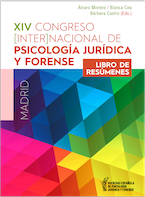
Análisis de la capacidad del nuevo protocolo de exploración para reforzar la dimensión preventiva de los Centros de Reconocimiento de Conductores
Francisco Alonso
(2022). LlibreLibro de resúmenes del XIV Congreso (Inter)Nacional de Psicología Jurídica y Forense.
Los Centros de Reconocimiento de Conductores son centros sanitarios donde varios facultativos, siguiendo un protocolo, realizan tareas de evaluación y pronostico. El Col.legi Oficial de Psicología de Catalunya ubica las actividades de los psicólogos en estos centros en la Guía de buenas prácticas para la evaluación psicológica forense y la práctica pericial; es decir, acentúa su dimensión forense, ya que la valoración tiene implicaciones legales, tiene un alcance legal que afecta a los comportamientos de quienes van a conducir. Es una de las tareas de los psicólogos más cargadas de responsabilidad, ya que esas implicaciones legales inciden sobre las posibilidades de movilidad autónoma de...
Los Centros de Reconocimiento de Conductores son centros sanitarios donde varios facultativos, siguiendo un protocolo, realizan tareas de evaluación y pronostico. El Col.legi Oficial de Psicología de Catalunya ubica las actividades de los psicólogos en estos centros en la Guía de buenas prácticas para la evaluación psicológica forense y la práctica pericial; es decir, acentúa su dimensión forense, ya que la valoración tiene implicaciones legales, tiene un alcance legal que afecta a los comportamientos de quienes van a conducir. Es una de las tareas de los psicólogos más cargadas de responsabilidad, ya que esas implicaciones legales inciden sobre las posibilidades de movilidad autónoma de las personas, pudiendo llegar a condiciones la vida social, familiar y laboral de quienes son objeto de esa valoración
Read more Hide ISBN: 978-84-126281-2-8 -

Intertraffic 2022
Francisco Alonso
(2022). Participació en congressosDr. Francisco Alonso, Director of INTRAS, has participated in the Intertraffic 2022 Congress, held from 8 to 10 November 2022 in Mexico. Dr. Alonso has presented the lecture "The necessary role of municipalities in the management of mobility and road safety: from regulations to plans supported by ITS" within the conference block "Sustainable Urban Mobility Systems", where success stories aimed at boosting multimodal transport, through the promotion of cycling programmes and other forms of active mobility, as well as land use planning and use of existing infrastructure, have been presented. These types of measures are undoubtedly part of the strategic vision to ensure sustainable, safe and...
Dr. Francisco Alonso, Director of INTRAS, has participated in the Intertraffic 2022 Congress, held from 8 to 10 November 2022 in Mexico. Dr. Alonso has presented the lecture "The necessary role of municipalities in the management of mobility and road safety: from regulations to plans supported by ITS" within the conference block "Sustainable Urban Mobility Systems", where success stories aimed at boosting multimodal transport, through the promotion of cycling programmes and other forms of active mobility, as well as land use planning and use of existing infrastructure, have been presented. These types of measures are undoubtedly part of the strategic vision to ensure sustainable, safe and inclusive mobility.
Read more Hide -
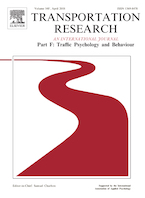
Cross-culturally approaching the cycling behaviour questionnaire (CBQ): Evidence from 19 countries
Sergio Useche, Francisco Alonso, Aleksey Boyko, Polina Buyvol, Isaac Castañeda, Boris Cendales, et all.
(2022). ArticleTransportation Research Part F. No.91:386-400
Given different advances in applied literature, risky and positive behaviours keep gaining ground as key contributors for riding safety outcomes. In this regard, the Cycling Behaviour Questionnaire (CBQ) represents one of the tools available to assess the core dimensions of cycling behaviour and their relationship with road safety outcomes from a behavioural perspective. Nevertheless, it has never been psychometrically approached through a cross-cultural perspective. Therefore, this study aimed to perform the cross-cultural validation of the CBQ, examining its psychometric properties, reliability indexes, validity insights and descriptive scores in 19 countries distributed across five...
Given different advances in applied literature, risky and positive behaviours keep gaining ground as key contributors for riding safety outcomes. In this regard, the Cycling Behaviour Questionnaire (CBQ) represents one of the tools available to assess the core dimensions of cycling behaviour and their relationship with road safety outcomes from a behavioural perspective. Nevertheless, it has never been psychometrically approached through a cross-cultural perspective. Therefore, this study aimed to perform the cross-cultural validation of the CBQ, examining its psychometric properties, reliability indexes, validity insights and descriptive scores in 19 countries distributed across five regions: Europe, America, Asia, Africa, and Oceania. For this purpose, it was used the data retrieved from a full sample of 7,001 urban cyclists responding to a large-scale electronic survey. Participants had a mean age of M = 36.15 (SD = 14.71), ranging between 16 and 83 years. The results of this large-scale study empirically support the assumption that the 29-item version of the CBQ has a fair dimensional structure and item composition, good internal consistency, reliability indexes, and an interesting set of validity insights. Among these results, there can be highlighted that: (i) Structurally speaking, the questionnaire works better under a three-factor dimensionality, keeping all its 29 items, whose factor loadings are >0.400 in all cases; (ii) The CBQ shows greater reliability indexes than in previous applications using smaller samples, with good Cronbach’s alphas [0.768 - 0.915], McDonald’s omegas [0.770 - 0.913] and Composite Reliability Indexes [981 - 0.994]; and (iii) Robust tests comparing riding behaviours of riders with different levels of risk perception and crash involvement support the concurrent validity of the Cycling Behaviour Questionnaire. These outcomes endorse the usefulness of the CBQ to assess both risky and positive riding behaviours of cyclists in different countries, contributing to assess and improve cycling safety from the human factors approach.
Read more Hide DOI: 10.1016/j.trf.2022.10.025ISSN: 1873-5517 -
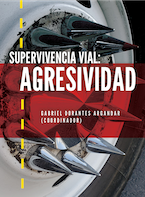
Gestión política de la agresividad vial
Andrea Serge, Mireia Faus, Francisco Tortosa, Francisco Alonso
(2022). LlibreSupervivencia Vial: Agresividad. No.Gabriel Dorantes Argandar (coordinador)
La agresividad vial es un fenómeno que afecta a los conductores de todas las ciudades, sin importar ubicación geográfica o diferencias culturales. Aproximadamente uno de cada diez conductores se caracteriza por ser fuertemente agresivo. ¿Ha visto usted a algún conductor acercar su vehículo a otro de manera agresiva o no respetar la distancia entre vehículos en las vías de alta velocidad? ¿Ha escuchado el uso excesivo del claxon o bocina? Encontrarse con un conductor agresivo es un factor que promueve el estrés, favorece los accidentes y lleva a la pérdida de bienestar en general, tanto en contextos urbanos como en otros no tan urbanos. Reducir la agresividad vial no es una misión nada...
La agresividad vial es un fenómeno que afecta a los conductores de todas las ciudades, sin importar ubicación geográfica o diferencias culturales. Aproximadamente uno de cada diez conductores se caracteriza por ser fuertemente agresivo. ¿Ha visto usted a algún conductor acercar su vehículo a otro de manera agresiva o no respetar la distancia entre vehículos en las vías de alta velocidad? ¿Ha escuchado el uso excesivo del claxon o bocina? Encontrarse con un conductor agresivo es un factor que promueve el estrés, favorece los accidentes y lleva a la pérdida de bienestar en general, tanto en contextos urbanos como en otros no tan urbanos. Reducir la agresividad vial no es una misión nada fácil. Para hacer que los conductores agresivos «reduzcan su velocidad», se requiere de la participación de todos los actores involucrados. En este trabajo nos enfocaremos en la Agresividad Vial, y en su Gestión Política.
Read more Hide ISBN: 978-607-8784-70-7 -

Is safety in the eye of the beholder? Discrepancies between self-reported and proxied data on road safety behaviors-A systematic review
Sergio Useche, Mireia Faus, Francisco Alonso
(2022). ArticleFrontiers in Psychology. No.13:964387
Recent studies have problematized on the lack of agreement between self-reported and proxied data in the field of road safety-related behaviors. Overall, and although these studies are still scarce, most of them suggest that the way we perceive our own road behavior is systematically different from the perspective from which we perceive others' behavior, and vice versa. The aim of this review paper was to target the number and type of studies that have researched the behavioral perceptions of different groups of road users, contrasting self-reported behavioral data with those reported by other users (proxied), and their outcomes. This systematic review followed the PRISMA methodology, which...
Recent studies have problematized on the lack of agreement between self-reported and proxied data in the field of road safety-related behaviors. Overall, and although these studies are still scarce, most of them suggest that the way we perceive our own road behavior is systematically different from the perspective from which we perceive others' behavior, and vice versa. The aim of this review paper was to target the number and type of studies that have researched the behavioral perceptions of different groups of road users, contrasting self-reported behavioral data with those reported by other users (proxied), and their outcomes. This systematic review followed the PRISMA methodology, which allows for the identification of relevant articles based on the research term. A total number of 222 indexed articles were filtered, and a final selection of 19 articles directly addressing the issue was obtained. Search strategies were developed and conducted in MEDLINE, WOS, Scopus and APA databases. It is remarkable how road users perceive themselves as behaviorally “safer” than the rest of road users in what concerns the knowledge of traffic norms and their on-road performance. In addition, and regardless of the type of user used as a source, self-reported data suggest their perceived likelihood to suffer a traffic crash is lesser if compared to any other user. On the other hand, proxied reports tend to undervalue third users' performance, and to perceive riskier behaviors and crash-related risks among them. The outputs of this systematic review support the idea that the perception of road users' behavior and its related risks substantially differ according to the source. It is also necessary to increase the number, coverage and rigor of studies on this matter, perhaps through complementary and mixed measures, in order to properly understand and face the bias on road users' risk-related behaviors.
Read more Hide DOI: 10.3389/fpsyg.2022.964387ISSN: 1664-1078 -
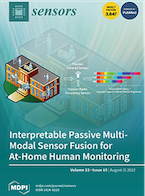
A Case Study on Vestibular Sensations in Driving Simulators
José V. Riera, Sergio Casas, Francisco Alonso, Marcos Fernández
(2022). ArticleSensors. No.22(15):5837
Motion platforms have been used in simulators of all types for several decades. Since it is impossible to reproduce the accelerations of a vehicle without limitations through a physically limited system (platform), it is common to use washout filters and motion cueing algorithms (MCA) to select which accelerations are reproduced and which are not. Despite the time that has passed since their development, most of these algorithms still use the classical washout algorithm. In the use of these MCAs, there is always information that is lost and, if that information is important for the purpose of the simulator (the training simulators), the result obtained by the users of that simulator will...
Motion platforms have been used in simulators of all types for several decades. Since it is impossible to reproduce the accelerations of a vehicle without limitations through a physically limited system (platform), it is common to use washout filters and motion cueing algorithms (MCA) to select which accelerations are reproduced and which are not. Despite the time that has passed since their development, most of these algorithms still use the classical washout algorithm. In the use of these MCAs, there is always information that is lost and, if that information is important for the purpose of the simulator (the training simulators), the result obtained by the users of that simulator will not be satisfactory. This paper shows a case study where a BMW 325Xi AUT fitted with a sensor, recorded the accelerations produced in all degrees of freedom (DOF) during several runs, and data have been introduced in mathematical simulation software (washout + kinematics + actuator simulation) of a 6DOF motion platform. The input to the system has been qualitatively compared with the output, observing that most of the simulation adequately reflects the input to the system. Still, there are three events where the accelerations are lost. These events are considered by experts to be of vital importance for the outcome of a learning process in the simulator to be adequate.
Read more Hide DOI: 10.3390/s22155837ISSN: 1424-8220









